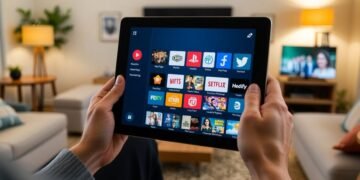Sleep tracking is currently a very popular trend, especially with devices like Fitbit vs Apple Health competing to offer the best features. Nobody knows the quality of their sleep and these apps are supposed to help with that. But there are so many of them on the market, it can be difficult to tell which one actually does a better job. In this article, I’ll be comparing Fitbit and Apple Health’s sleep tracking features to determine which of the two will be the best in 2025.
Key Takeaways
- Fitbit and Apple Health watchOS 9 both have distinct sleep tracking features but are not always accurate
- Fitbit is celebrated for its accuracy in tracking sleep cycles, while Apple Health offers a convenient integration with other health metric.
- The user experience differs; Fitbit is more straightforward, while Apple Health provides a more polished interface.
- Battery life is also a concern; Fitbit usually lasts longer than the Apple Watch.
- Fitbit or Apple Health is a personal choice depending on your preferences, such as integrating with other devices or having specific sleep tracking features.
Understanding Sleep Tracking Technology
How Sleep Trackers Work
Sleep trackers are now common among those who want to know more about their sleep. These devices that are worn on the wrist or placed under the mattress are meant to give a report on your sleeping habits. They work by tracking factors including the heart rate, movement and at times skin temperature. Then the metrics are analyzed by algorithms to determine the different stages of sleep; light, deep and REM sleep. Although they are not as accurate as a clinical sleep study, such as polysomnography, they can be quite useful in a daily awareness.
The Role of Algorithms in Sleep Tracking
The sorcery behind sleep trackers is the algorithms. These are complicated sets of procedures that analyze the raw data collected by the device. For instance, a sharp decrease in the heart rate and a decrease in movement could indicate a transition to deep sleep. Algorithms are improved regularly but they are making predictions on the information available to them.
dy tool for everyday awareness.
The Role of Algorithms in Sleep Tracking
The magic behind sleep trackers lies in their algorithms. These are complex sets of rules that interpret the raw data collected by the device. For instance, a sudden drop in heart rate and reduced movement might indicate a transition into deep sleep. Algorithms are continuously refined to improve accuracy, but remember, they’re making educated guesses based on the data they have.
Limitations of Wearable Sleep Trackers
Despite their usefulness, sleep trackers are not without their limitations. Sometimes they are inaccurate and distinguish between different types of sleep poorly. The accuracy can be off on account of the placement of the device on the body and individual differences in sleep. Furthermore, these gadgets may not be appropriate for everyone. It is important to realize that, although they give some indication of your sleep behaviour, they cannot and should not be used as a substitute for the advice of a professional or diagnosis.
Sleep trackers help to develop an awareness of the patterns of one’s sleep and to better improve on one’s sleep habits. However, they may not be for everyone and can sometimes give inaccurate data. Find out how these devices can affect your knowledge of sleep.
Comparing Sleep Tracking Features
Fitbit’s Sleep Tracking Capabilities
Fitbit sleep tracking is quite extensive to offer you a complete view of your sleep habits. A another great feature is the ability to track different sleep stages including -light sleep, deep sleep and REM sleep. This is made possible by tracking the heart rate and movement. Also, Fitbit has alarm features that are quite calm and they wake you up gently at the right time in the sleep cycle to make you feel less tired. For those who are interested in the quality of their sleep, Fitbit gives you reports and ratings that can tell you a lot about your sleep quality. Fitbit offers various sleep-tracking features, including smart alarms and health and fitness tracking, enhancing users’ ability to monitor and improve their sleep quality.
Apple Health’s Sleep Tracking Features
Features of Apple Health’s Sleep Tracking Apple Health has greatly improved with the Apple Watch and the company has greatly improved the watch’s sleep tracking capabilities. WatchOS 9 introduced the ability to track sleep stages like Fitbit and the Apple Watch monitors your heart rate and movement to predict your sleep cycles. It is also quite unique in that it can link with other Apple products which provides one integrated experience if you are already in the Apple environment. Another useful feature is the “Wind Down” mode that helps you set the right mood for sleep by turning off notifications and other distractions.
Key Differences Between Fitbit vs Apple Health
Key Differences Between Fitbit and Apple Health. Several key differences stand out when comparing Fitbit and Apple Health. Fitbit, however, gives more information about sleep stages. But Apple Health can provide a more integrated experience with its ecosystem. As for accuracy, based on experience, the Apple Watch may register more light sleep than Fitbit does, which is probably a result of how each device works with the data. Fitbit’s app is also praised for its intuitive design, while Apple Health is appreciated for its seamless integration with other health metrics on iOS devices.
Depends on your taste and which features are important to you it can be Fitbit or Apple Health. Each has its own advantages be it better sleep tracking or compatibility with other devices.
Accuracy of Sleep Data
How Accurate is Fitbit?
So, How Accurate is Fitbit? Some of the features that have made Fitbit devices popular in tracking sleep are as follows. They give a fairly good indication of your sleep patterns based on your heart rate, movement and in some cases, your skin temperature. But let’s get real, it’s not perfect. Fitbit is very good at tracking when you are asleep to the tune of 96%, but it will overestimate the amount of time spent sleeping by almost 9 minutes on average. In identifying various sleep stages, Fitbit can determine light sleep with 81% accuracy, deep sleep with 49%, and REM sleep with 74%. It’s a pretty accurate description, to some extent.
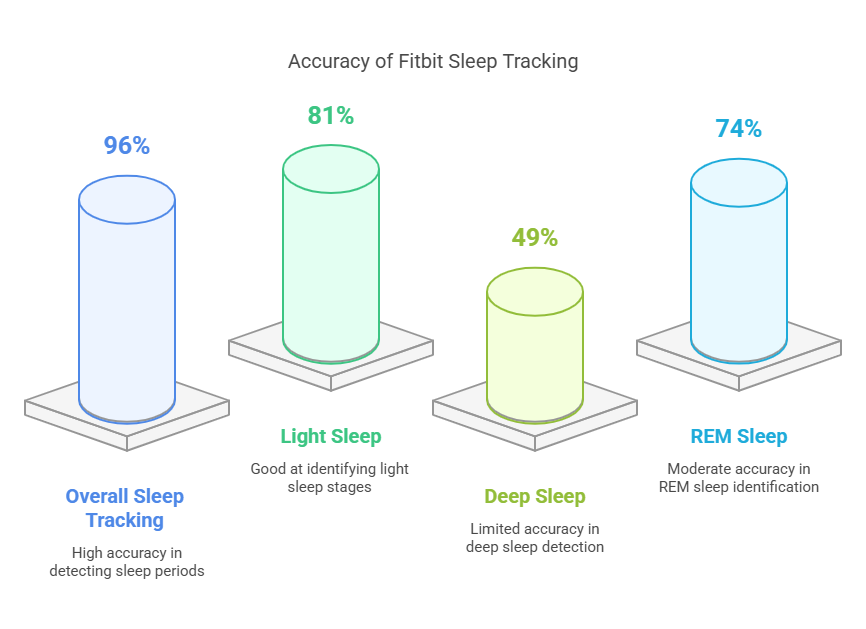
Evaluating Apple Health’s Accuracy
Whereas Apple Health plays a strong role in the sleep tracking arena, Fitbit is still the gold standard for many users. The latest updates, it claims to be more accurate than ever. Apple Watch might edge out Fitbit slightly for tracking sleep stages, but there’s still no definitive scientific consensus. The Apple Watch is quite good at tracking sleep onset and duration, but it sometimes reports slightly longer sleep times than the actual time spent in bed. It’s like a friendly exaggerator, giving you a little more credit for your rest.
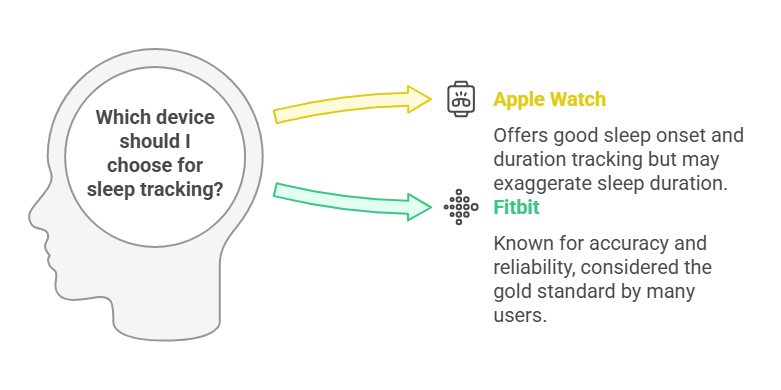
Factors Affecting Sleep Data Accuracy
Accuracy of these devices can be affected by several factors:
- Device Fit: How tight or loose your wearable fits can impact data collection.
- Position: Does it make a difference what wrist you wear it on, or if you switch wrists, can it change results?
- Movement: This can cause discrepancies – how much you toss and turn during the night.
While wearables such as Fitbit and Apple Health can provide a convenient glimpse into your sleep patterns, they are not professional sleep studies. They are more like a helpful friend who can point you in the right direction instead of being a definitive guide.
User Experience and Interface
Ease of Use for Fitbit
The user interface of Fitbit is designed with simplicity in mind. It is easy to navigate through the menus and does not involve a lot of complexity, even for those who are not tech-savvy. The app is easy to navigate to your sleep data and the information is presented clearly and concise. Here’s what makes Fitbit stand out:
- Dashboard Layout: The dashboard is customizable which enables the user to focus on the data they consider most important.
- Quick Syncing: Fitbit devices connect without a hassle to the app such that your sleep data is always current.
- Notifications: You will get subtle nudge to exercise or to wind down for sleep, which will add to the overall usability.
Navigating Apple Health
Apple Health integrates well with other Apple products, it also combines data from third-party apps. Apple Health, however, offers a more integrated approach, and combines sleep data with other health metrics. However, some users find the interface a bit overwhelming at first. The main aspects are:
- Comprehensive Data View: Apple Health collects data from different apps and devices and gives you a complete view of your health.
- Customization Options: Only users can decide what information to show first, making the application individual for every user.
- Regular Updates: Apple is one of the companies that regularly update its app and make new features and improvements.
User Feedback and Reviews
The feedback from users is quite mixed but mostly positive for both platforms. Fitbit users love the Fitbit Inspire 3 for being the best fitness tracker for most people, and for being simple and efficient. Apple Health users like the integration with other Apple products, but some have reported that it can be a bit complicated.
“Selecting between Fitbit and Apple Health depends on what you are looking for the most: a simpler and easier to use interface or a more connected health platform with other devices. Each has its advantages so it really comes down to what suits your lifestyle best.”
Integration with Other Health Metrics
Fitbit’s Health Ecosystem
Fitbit has created a good ecosystem that helps people monitor many aspects of their health. From heart rate variability (HRV) to respiratory and blood oxygen saturation, Fitbit gives a holistic view of your health. Users have asked for the Fitbit app to support syncing of these health metrics, including mindful minutes, which indicates that a lot of people are interested in a more all-encompassing approach to health monitoring.
- Heart Rate Variability (HRV): Offers information on stress and fundamental fitness levels.
- Respiratory Rate: Observes breathing rate and patterns, which is helpful in fitness and wellness monitoring.
- Blood Oxygen Levels: Assists in monitoring oxygen saturation, particularly during night time.
Apple Health’s Comprehensive Approach
Apple Health tries to take a broader approach to health tracking by incorporating a variety of data points. Apple Health is a good example of an app that seeks to be the one-stop shop for health data, whether it’s just your daily steps, your sleep analysis or, if you’re female, even your menstrual cycle tracking. It’s a versatile tool for anyone looking to get a clearer picture of their health thanks to its ability to sync with other devices and apps.
- Sleep Analysis: Provides very detailed information on the sleep patterns.
- Menstrual Cycle Tracking: It assists users in tracking their menstrual cycle and symptoms associated with it.
- Activity Rings: It motivates users to be active by completing their rings every day.
Benefits of Integrated Health Tracking
It can be a big advantage to have all of your health data in one place. Both Fitbit and Apple Health integrate with other health metrics, which gives a more holistic view of a person’s health. This integration can lead to better health decisions and a more personalized health experience.
“Not only does it look at how many steps your taking, it looks at your heart rate, your sleep, your blood pressure, your stress levels, your meditation — when all your health data syncs seamlessly, it paints a clearer picture of your overall well-being. It’s like having a personal health assistant on your wrist, guiding you to make healthier choices every day.”
Each of these platforms offers unique benefits that cater to different needs, but both Fitbit and Apple Health are offering them. Which one I choose is based on what parts of health tracking I need most.
Battery Life and Wearability
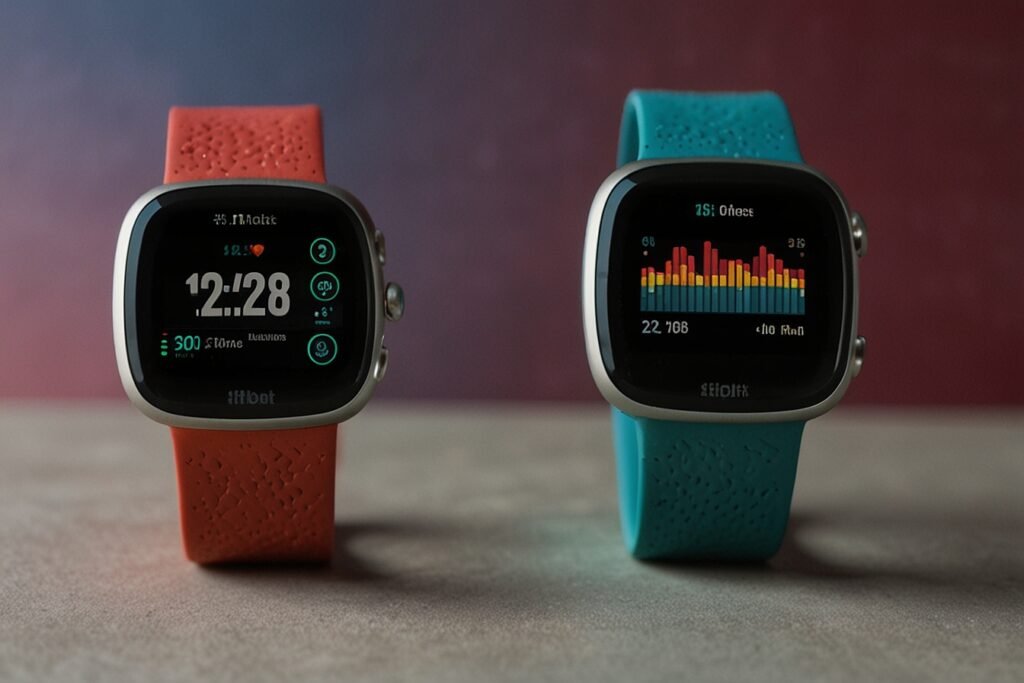
Fitbit’s Battery Performance
Fitbit devices are famous for their long lasting battery life, which can last for several days on a single charge. For example, the Fitbit Inspire 3 can last up to 10 days in real life, but you may get a bit less. This extends battery life means that you are not always connected to a charger and you can actually use your sleep and daily activity tracking.
Apple Watch’s Battery Life
On the other hand, Apple Watch, including Series 10, can work for up to 18 hours on a single charge. This means that you have to charge it every day, or even twice if you want to use it for tracking your sleep at night. Although it may seem like a disadvantage, the Apple Watch has one of the best quick charge features which can get 80% charge in about an hour.
Comfort and Wearability
When it comes to comfort, both Fitbit and Apple Watch have their strengths. Fitbit devices are generally lighter and more compact, making them ideal for wearing overnight without discomfort. On the other hand, the Apple Watch offers a sleek design with customizable bands, allowing users to find their perfect fit.
This choice often boils down to preference: What matters more, the battery life or the seamless integration with other Apple devices?
Choosing the Right Sleep Tracker for You

Considerations for Apple Users
If you are already a part of the Apple ecosystem, the Apple Watch is a natural choice for you. It connects with your iPhone without a hitch and shares your health data between the two devices. The Apple Health app gives a comprehensive view of your sleep patterns and the sleep cycles and disturbances. Also, some features like sleep apnea detection can be very useful for those with certain health issues. If you are looking for a device that can monitor your sleep and also provide a lot of health and fitness features then you should consider getting the Apple Watch.
Why Choose Fitbit?
In the sleep-tracking realm, Fitbit has been a leader for a long time, and for a good reason. They provide thorough sleep insights, including REM sleep and a heart rate tracker. Fitbit’s app is straightforward, and it is easy to grasp your sleep data at a glance. If you are looking for a device that is primarily a health metric tracker with fewer bells and whistles, then Fitbit might be the way to go. Also, there are no subscription requirements, so it can be a more economical choice in the long run.
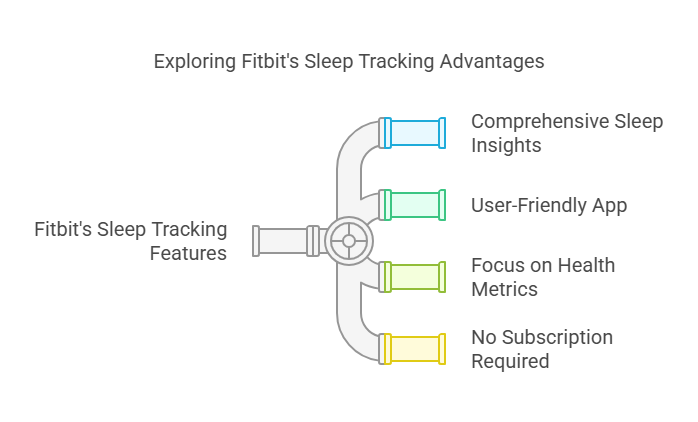
Making the Best Decision for Your Sleep Needs
In choosing between Fitbit and Apple Health, consider what features are most important to you. Do you want a device that integrates well with your existing tech ecosystem or are you looking for something more specialized? Consider your lifestyle and budget as well.
“Picking the right sleep tracker is about understanding what you need from the device and making sure those needs align with the device’s features.” If you aren’t sure what you need from a sleep tracker, take some time to think about it.”
In the end, the right choice depends on your needs and your plans for the device. Whether it’s the all-round features of the Apple Watch or the specific sleep features of Fitbit, each offers something different.
Conclusion
So, there you have it. All things considered, Fitbit and Apple Health are good and have their flaws in tracking sleep. It shows, especially with the detailed sleep cycle breakdowns, that it has been in the game longer and is less fuss. But, hey, Apple Health is better if you are already in the Apple ecosystem, especially with the latest updates. It isn’t perfect, but it’s getting better. The bottom line is that it really comes down to what you are looking for. If you are into detailed sleep data and not bothered by using a separate device, then, Fitbit might be the way to go. But if you are looking for a device that can do more than just track sleep and integrate well with your other devices, then, Apple Health is worth a look. Either of the two is a pretty good choice to aid you in getting better nights’ rest.
Frequently Asked Questions
How do Fitbit and Apple Health track sleep?
Both Fitbit and Apple Health use sensors to monitor your movements and heart rate while you sleep. Fitbit devices often use a combination of heart rate and motion data, while Apple Health relies on the Apple Watch’s sensors to track sleep stages.
Which app is more accurate for sleep tracking, Fitbit or Apple Health?
It’s hard to say which one is more accurate as both have their strengths. Fitbit has been known for its sleep tracking for a long time, while Apple has made improvements with WatchOS updates. User experiences vary, so it might depend on personal preference.
Can I use both Fitbit and Apple Health for sleep tracking?
Yes, you can use both devices to track your sleep. Some people like comparing the data from both to get a fuller picture of their sleep habits.
What are the main differences between Fitbit and Apple Health sleep tracking?
Fitbit often provides more detailed sleep stage information, while Apple Health integrates sleep data with other health metrics. Fitbit might offer more insights into sleep patterns, whereas Apple Health provides a more holistic view of your health.
Do I need a subscription to access sleep tracking features on Fitbit and Apple Health?
Basic sleep tracking features are available without a subscription on both platforms. However, Fitbit offers a premium subscription for more detailed insights and reports.
How does battery life affect sleep tracking on Fitbit and Apple Health?
Battery life is important for tracking your sleep. Fitbits generally have longer battery life, which means you might not need to charge them as often. Apple Watches may need more frequent charging, which could interrupt sleep tracking if not managed properly.















